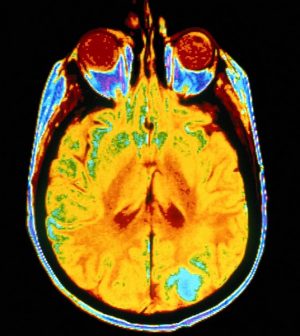- Could Your Grocery Store Meat Be Causing Recurring UTIs?
- Are You Making This Expensive Thermostat Error This Winter?
- Recognizing the Signs of Hypothyroidism
- 10 Strategies to Overcome Insomnia
- Could Artificial Sweeteners Be Aging the Brain Faster?
- Techniques for Soothing Your Nervous System
- Does the Water in Your House Smell Funny? Here’s Why
- Can a Daily Dose of Apple Cider Vinegar Actually Aid Weight Loss?
- 6 Health Beverages That Can Actually Spike Your Blood Sugar
- Treatment Options for Social Anxiety Disorder
Nicotine Study Shows Mind’s Power When It Comes to Drugs

How much a person believes in the strength of a drug might influence how powerfully that drug influences brain activity, a new study has found.
Smokers told to expect a low, medium or high dose of nicotine from an e-cigarette showed a brain response that tracked with the purported dose, even though nicotine levels were actually constant, researchers said.
“We set out to investigate if human beliefs can modulate brain activities in a dose-dependent manner similar to what drugs do, and found a high level of precision in how beliefs can influence the human brain,” said senior researcher Xiaosi Gu. She’s an associate professor of psychiatry and neuroscience at the Icahn School of Medicine at Mount Sinai, in New York City.
For the study, Gu and her team recruited a group of people hooked on nicotine and had them puff on an e-cigarette, after telling them how powerful a nicotine dose they should expect.
The participants then underwent brain scans while performing a decision-making task known to engage parts of the brain affected by nicotine.
“Beliefs can have a powerful influence on our behavior, yet their effects are considered imprecise and rarely examined by quantitative neuroscience methods,” Gu noted in a Mount Sinai news release.
The thalamus — an important binding site for nicotine in the brain — showed a dose-dependent response to each person’s beliefs about the nicotine strength of their e-cigarette.
A similar effect also was observed in the connectivity between the thalamus and the ventromedial prefrontal cortex, a brain region that is considered important for decision-making and belief states.
The new study was published Jan. 3 in the journal Nature Mental Health.
These results provide a potential explanation why individual responses to drugs can vary widely, Gu said.
By manipulating these beliefs, doctors might be able to help people deal with addiction or respond better to drugs used in mental health treatment like antidepressants or psychedelics, she said.
“The finding that human beliefs about drugs play such a pivotal role suggests that we could potentially enhance patients’ responses to pharmacological treatments by leveraging these beliefs,” Gu said.
“It would be fascinating to examine, for example, how the potency of a drug might impact the effect of drug-related beliefs on the brain and behavior, and how long-lasting the impact of those beliefs might be,” Gu added. “Our findings could potentially revolutionize how we view drugs and therapy in a much broader context of health.”
More information
The U.S. Food and Drug Administration has more about nicotine.
SOURCE: Mount Sinai, news release, Jan. 3, 2024
Source: HealthDay
Copyright © 2026 HealthDay. All rights reserved.










